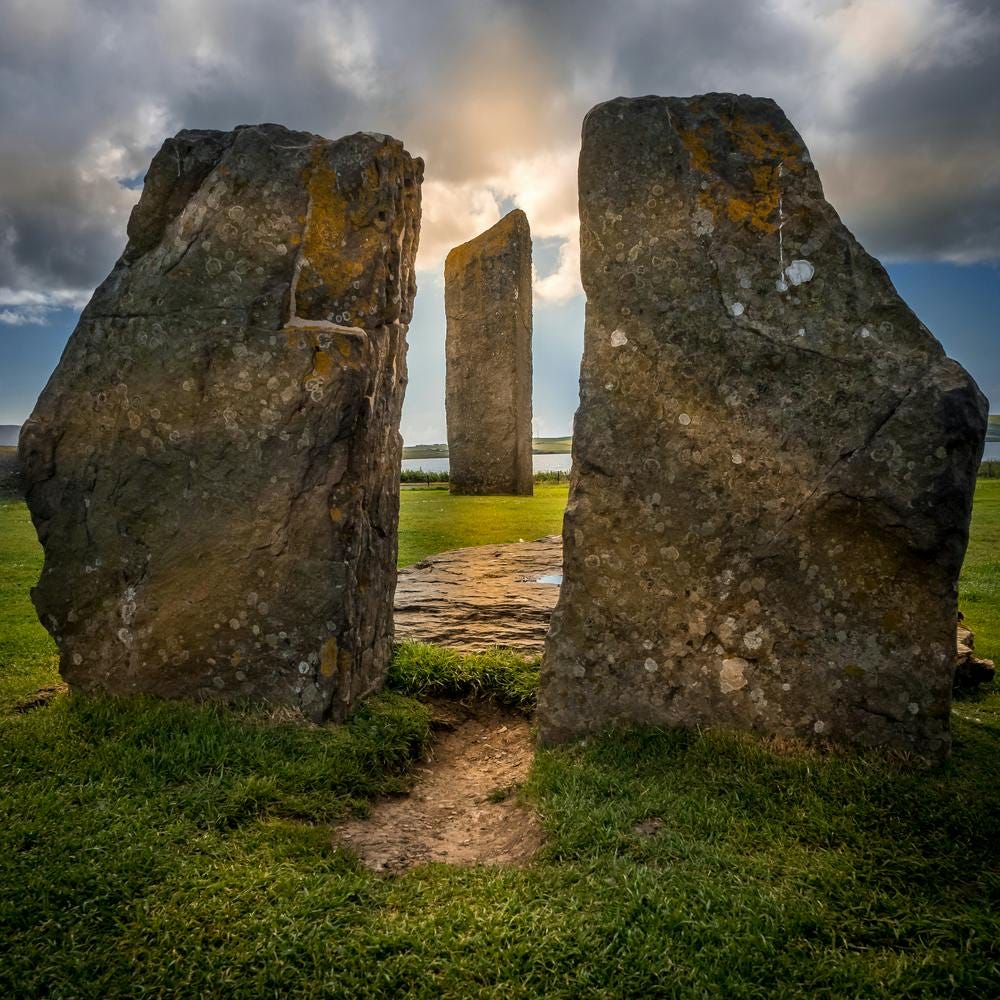The Druids and the Saints
The Druids, those sages of the groves, were priests of the most ancient order, bearers of a wisdom that had passed through the catastrophes of the world. They remained, though diminished, as an ember glowing beneath the ashes of history. Their lineage was no mere cultural artifact; it was a Hyperborean priesthood “after the order of Melchizedek” — one that did not derive from fleshly descent, nor from written law, but from a primeval consecration rooted in the very mystery of creation. Their sacrifices upon the oak-shadowed altars — until, in their downfall, they turned to the shedding of human blood — were echoes of an older liturgy, one that prefigured the Lamb slain from the foundation of the world.
They were, indeed, the faithful remnant of Atlantis, that doomed isle whose priests fled the sinking of their land, taking refuge in the far corners of the earth where the great currents of wisdom still flowed unseen beneath the surface of history. But theirs was not the hubristic priesthood of a dying age, nor the corrupted rite of those who sought to wield power apart from the harmony of heaven. The true ones, the Elendili, the “Faithful” — in the manner of the Númenórean remnant visioned by the Seer of Merton College — preserved the sacred fire, guarding it as the world around them grew darker, as their own numbers dwindled, as their temples fell into ruin.
Thus, when Joseph of Arimathea came to the mist-veiled isle of Avalon, bearing the mystery — the “rune,” as the Gothic Bible translates the Greek — of the Holy Grail, he was not planting something foreign, but reawakening something ancient, something long dormant yet never wholly extinguished. His thorn-staff took root and blossomed in the soil of Britain not as a conquest, but as a fulfilment; his mission was not the destruction of the old, but its renewal and transfiguration.
Who were those last faithful ones who had kept watch through the long night? We do not know their names, nor do the chronicles record their lineages, but they were there — hidden ones, awaiting the coming of the Christ. They were those whose eyes had long been turned to the horizon of time, who had read the prophecies in the whispering leaves and the flowing waters, who had understood that the true king, the true priest, was coming to make all things new. And when the Gospel arrived upon their shores, it was not to abolish their wisdom, but to crown it with the radiance of the Incarnate Word.
The real successors of the Druids, then, were not those who clung to the dying remnants of their external rites, corrupted as they were with darkness and deviltry, nor those who sought only to preserve the forms without the fire. Rather, they were the ancient British saints — the monks of the wilderness, the hermits who settled in the lonely glens, the holy ones who wove the harmony of heaven and earth, sea and grove, into prayer that breathed and burned in the depths of their hearts. They did not merely inherit a tradition; they transfigured it. They took the old wisdom and restored it to its proper source — not as a technique of power, nor as a magic severed from its Maker, but as a participation in the divine Presence. Magic was returned to its roots, to its true essence: not control, but communion.
For in the end, all the ancient arts and all the scattered lights of wisdom find their consummation in Love. The Incarnation is the great synthesis, the unifying fire that gathers all things into itself, kindles all things in itself, perfecting rather than destroying. The Logos is not an interruption of the world’s story, but its meaning made manifest. And so, what was begun in the temples of Atlantis, and continued in the groves of the Druids, what was carried across the ages by those who remained faithful, found its fulfilment in the saints who spoke with God as friend speaks to friend, whose very lives became vessels of divine fire.
It was no longer a matter of men bending the forces of the world to their will; it was man himself being conformed to the divine harmony, cor ad cor loquitur — heart speaking to heart, the sacred fire of the Grail, that luminous Stone, burning in the depths of human nature itself.



Have you ever read the Kolbrin? I just took pics of the pages concerning St. Joseph & the Druids, but it doesn't look like I can share them in the comments.
Are you familiar with the fiction of Stephen Lawhead? Thinking of the Pendragon Cycle particularly, with the Atlantis and Druid connection.